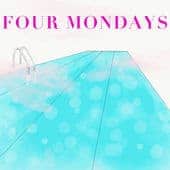Interview with creator of the audio drama, Four Mondays


In a podcast landscape where everything is serialized and there’s so much to listen to, Four Mondays is refreshingly complete and easy to binge since it’s just four 30-minute episodes told over four Mondays. Also, it’s a mystery, but it’s not heavy like all the wrongful conviction cases and murder mysteries; it’s funny and compelling.
Four Mondays was made possible by receiving a 2017 Project Grant from the Regional Arts and Culture Council https://racc.org/. We connected with Sunny to discuss his unique audio drama, how he was able to fund it, and what he has planned next.
Brendan and Sarah: What was the Inspiration to create Four Mondays?
Sunny Bleckinger: I’ve always wanted to return to San Francisco – I was born in Oakland and spent much of my early years in the Bay Area. But it’s impossible to live there now without some kind of gigantic salary, which I suspect I’ll never have. So instead I decided to make a little imaginary space for myself, an audio drama set down there, set at a time when working-class people still made up a good chunk of the city. I looked through old photos of San Francisco, found stories of all the bygone swimming pools. There used to be so many gorgeous pools down there. And they’re all gone now. Which struck me as a neat little metaphor for the fact that so much color has been stripped from the city. That, and the atmosphere of a pool sounded like a good setting for an audio drama – so many evocative sounds to paint the setting. And then I just went from there, spent around six months working on the script, showing it to some writer friends and making lots of revisions. I wish I could say there was a sudden burst of inspiration – though there were a lot of small bursts throughout, but mostly it was fine tuning and wondering, especially wondering what each character would say at different points. That was definitely a driving force for me, an inspiration I guess, the characters coming to life. It took awhile, I always spend a lot of time imagining atmosphere, figuring out the boundaries and rules for the setting, and then I play with character sketches until some clear lines of motivation emerge for each of them, and then the script really starts moving. Because at that point, I lose some control over the story, because I start seeing the characters as real people, and I have to figure out what they would care about at each moment, how would they react. I really grew to love these people, they made me laugh a lot as I was writing, and they made me sad. Which I guess is weird, but these characters, these invented people, they were some of the most inspiring parts in putting all of this together.
B&S: You were able to secure a grant to create this series. Can you explain a bit about how you found grants and what the process is like?
SB: About a year before I got the grant I was talking to a photographer friend, she had gotten a couple grants and she told me that a good place to start is RACC. They’re a great organization in Portland, Oregon, they really hold your hand through the process, which I very much needed, I had never applied for a grant before. They have orientation meetings to explain every step of the application, and if you get it done early enough, one of their advisors will even go over it on the phone with you, saying what’s strong and what isn’t, and why. So I put a lot of time into it, even though in the end it’s a big gamble. But I pushed on through the process because I noticed that being forced to fit my ideas into their borders pushed me to be very realistic about how to accomplish the project. And so I turned in the application, and then forgot about it for a couple months, honestly not expecting to get anything from them. And then I was all set to start writing, and had planned to do it all with no money and then they shocked me with an email. It couldn’t have come at a better time, I was feeling pretty low and for an established organization to say basically, We see you, we see what you’re trying to do and we support you, that was really invaluable to me.
B&S: This is a full cast production. How was working with so many voices, and how did you find them?
SB: It was amazing. With any project I made in the past, I always found non-actors, partially because I didn’t feel confident enough as a director to work with real actors, and also because I didn’t feel comfortable asking actors to work for free. But this time with a grant, I could actually pay people. That was an incredible feeling.
I decided to get experienced actors for the main roles, and non-actors for the smaller parts. A friend introduced me to Kurt Conroyd, I had heard of him because his new show “The Benefits of Gusbandry” was getting a lot of press, at least in Portland, and I watched some clips with him and he seemed perfect. So I sent him the script, he liked it and we get coffee and just hit it off. He’s amazing to work with, so elastic in his delivery, I couldn’t believe how much he could add to the simplest of lines, and then like a switch he could become completely dry in tone, at just the right comedic moments.
I had seen Lorraine Bahr in a play while I was still in the early phase of the script, and I remember thinking she’d be perfect for Edna. Her role in the play was a character that transformed slowly from a very strong confident woman to a frail insecure character, and she did it so well, it was really inspiring. And so I sent her the script when it was done and I was thrilled and shocked and a little intimidated when she said yes.
I’m realizing that I could go on forever about all the actors, they meant so much to me, but I want to say a little about the non-actors, and how much I value the sound of a natural voice, a non-acting voice, reading lines as if they were their own. For one, I was surprised when talking to a well-established theatre producer here in Portland, I was asking his advice and he said to never get non-actors, that there was no reason for it, that it’s like putting together a basketball team with non-athletes. But I disagree.
Someone’s voice, someone’s honest natural voice, can suggest so much about the life they’ve lived so far. Maybe that’s why older people’s voices are so interesting to listen to, even if they’re not really saying much at all. I knew what each character’s voice needed to embody, so I was looking for very specific vocal qualities, and that can suggest certain kinds of lives that people have lived, certain parallels that would shape their voice in the same way as the character. And when you’re tuned in for it, you’ll hear these rich colorful voices everywhere, standing in line at the store, riding the bus.
I remember our neighborhood had a block party, and I went straight for the table with all the older neighbors and that’s where I found the voice for Saul. He started talking about the tamales someone had brought and I thought Oh my God you’re Saul. His voice was so small and feminine and cracked.
The person who read the lines for Earnestine is the woman who mops floors at the same business where I mop floors. She came by my house to pick up some supplies, and I was talking to her in my front yard and it hit me that she might be perfect. I asked if she had time right then and she did so I recorded her right there in my basement. She had her little dog with her, and she curled up in her lap and slept while she repeated the lines in my mic.
With non-actors, I find that if you have them read the script, then it will sound like they’re just reading, so what I do is say the lines and have them repeat after me. It creates more editing work on my end, but it’s worth it because they come off much more natural sounding.
B&S: What was the most fun and biggest challenge of producing Four Mondays?
SB: I hope this doesn’t sound weird but the most fun I had was just being alone in my office reworking the dialogue, which at a point didn’t feel like me talking but really felt like the characters, and they became so funny. My wife would tell me how much she could hear me laughing – I set up a little office space in our basement, where I can giggle and write alone. And to be honest, I’ve been that way my whole life. Past roommates and also my siblings growing up would comment regularly on my giggling alone in my room. I’ve just always cracked myself up imagining situations and dialogues, which is kind of embarrassing to admit.
It’s hard to say what the biggest challenge was, all of it I guess. I’m chronically critical of myself, and every step I take I have to analyze and check again and worry a little that it’s probably wrong and keep reworking things. And I’m never certain something’s working until it makes me laugh. And it needs to make me laugh again the next day, and the day after that, and then I know I can move on.
B&S: What’s next for you now that Four Mondays is completed and available, and how can people find you online if they want to get in touch?
SB: It was really rough for me when this play was done. I fell in love with these characters, and once it was over I dropped into a depression. I wasn’t ready to let go of them. I’d love to produce a second season, but realistically I think I should wait and see if there’s enough interest, and then I’ve got to figure out funding.
I’m also sketching another audio drama, about a detective in Alaska, and hoping to have the script done this year, and then start recording soon after that.
My website is here: 4mondays.com. Anyone can just email if they want to say hi. sunnybleckinger@gmail.com. I’m not super great with social media, I find it overwhelming and it seems pretty bad for my mental health, so I try to avoid it. Though completely staying off the social part of the internet is unfortunately impossible unless you want to be a hermit, which I don’t. I love people. I just prefer to see them in person, or hear their voices on the phone.













Comments
Comments are closed.